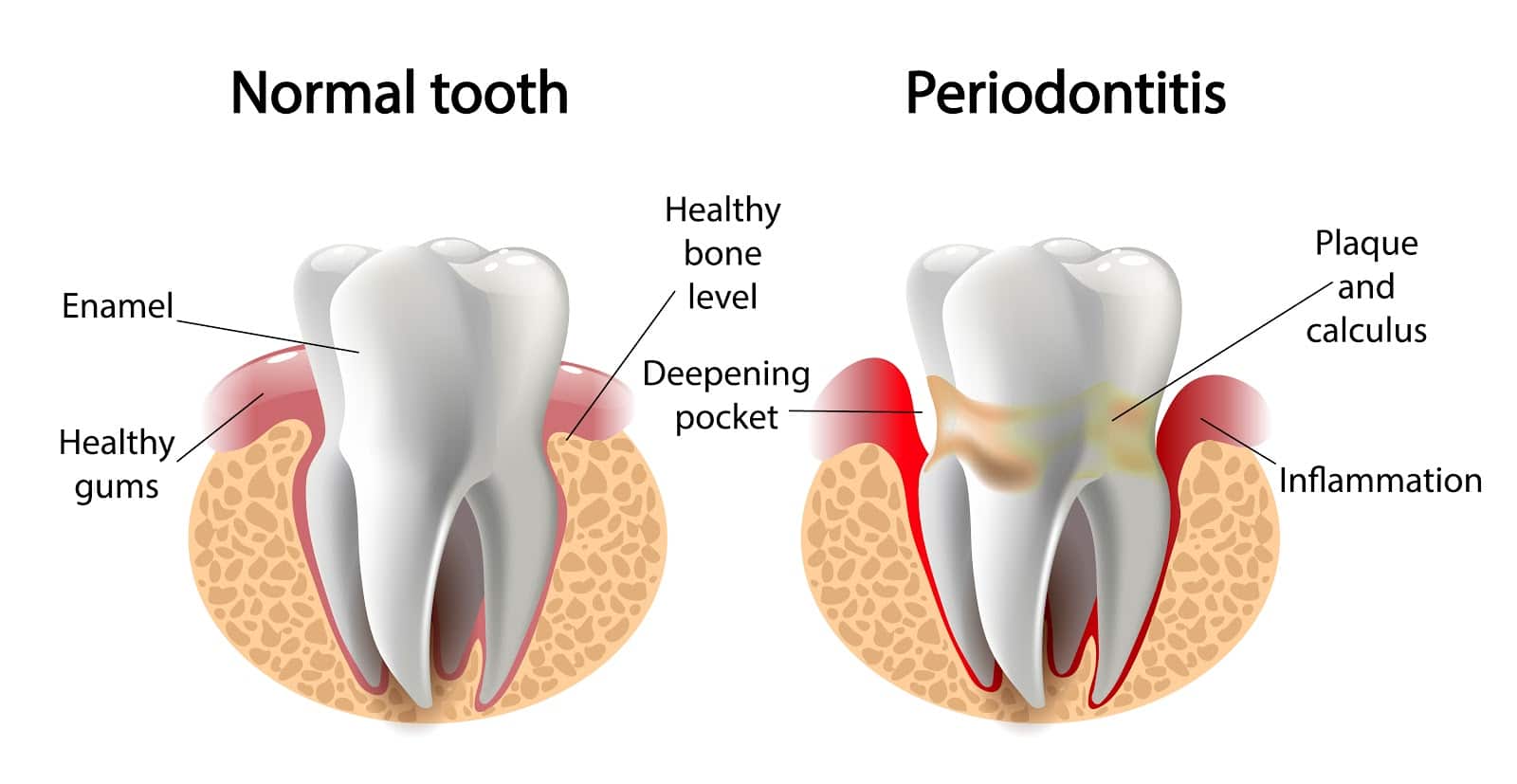
While no one wants gum disease—also known as periodontal disease—it can be easy to ignore if you believe that it only impacts your gums. However, that’s only what the early stages affect.
Untreated gum disease has a far more significant impact on your entire body, so it’s important you understand before you decide to wait to schedule your next Bridge Creek Dental visit.
Oral Health Is Directly Impacted By Gum Disease
When your dental hygiene is impacted by gum disease, you can expect the repercussions over the rest of your oral health, not just the signs like tender gums that can bleed easily. Some ways that gum disease impacts your oral health are:
- Bad breath – We’ve all had bad breath, but when you have gum disease, the bacteria can cause perpetual bad breath that can’t be gotten rid of without addressing your periodontal disease.
- Change in teeth position – As your gums become more swollen and damaged by the gum disease, your teeth can start to shift from their normal position. This shifting can cause issues with your bite, lead to gaps, and other issues.
- Tooth loss – Gum disease can cause the nerves in your teeth to become infected and die, resulting in the loss of your teeth. You will likely see your teeth start to shift and become loose before you reach this point, so watch for those signs and take them seriously.
- Jawbone density loss – Periodontal disease can also quickly spread to your jawbone, destroying the bone. The resulting bone density loss can cause changes in your facial features and also cause your teeth to fall out.
- Abscess – You can also develop dangerous pockets of infection in your gums. These abscesses are especially risky if the built-up toxins reach your bloodstream, as it can make you critically ill and potentially lead to death.
As gum disease can be painless, it is important that you keep an eye on these other oral health impacts. That way, you can come into our dental clinic and have your gum disease treated.
White Blood Cells Can Be Destroyed
Your white blood cells are a key part of your immune system and work to destroy infections as well as harmful bacteria. But when gum disease takes a serious hold on your system and spreads beyond your gums, your white blood cells can become overwhelmed. It can reach the point where your white blood cells are being destroyed by the high load of gum disease pathogens.
With your white blood cells out of action or severely reduced in volume, you can become more prone to infectious disease from the common cold to more serious infections.
Your Liver Can Be Impacted
One of the functions of the liver is to reduce inflammation in your body, and gum disease can be the source of serious inflammation.
In response to the threat of gum disease inflammation, your liver can put out an enzyme that can help address the issue. Unfortunately, this same enzyme can also increase your risks of having cardiovascular problems such as strokes and heart attacks.
Dementia And Gum Disease Can Be Connected
In a surprising new study on the connection between dementia and gum disease, scientists found that the pathogen which makes up periodontitis was found in the brains of patients’ with Alzheimer’s disease.
Not only was the disease present in their brains, but when it was studied in mice, the presence of the gum disease pathogen added to the production of amyloid plaques. As amyloid plaques are a key factor in the cognitive decline in Alzheimer’s patients, this connection between the two diseases is very concerning.
Gum Disease Can Raise The Risk Of Certain Cancers
The chronic inflammation of your gums can also put you at a higher risk for certain types of cancers. While researchers haven’t pinpointed the exact connection, the people they have studied have had a history of gum disease linked to their higher rates of cancer. The cancers which have been linked to gum disease are:
- Pancreatic cancer
- Melanoma cancer
- Esophageal cancer
- Breast cancer
- Gallbladder cancer
- Lung cancer
Ways To Prevent Periodontal Disease
By preventing periodontal disease from gaining a foothold in your life, you can better protect you from many of the connected health concerns.
- Come in for biannual dental cleanings – Coming into our dental clinic for regular, preventative dental care can be one of your biggest protection against gum disease. With your twice a year cleaning and check up, our dentists can catch the beginning signs of gum disease and help effectively treat the problem.
- Floss daily – By flossing in the evening, you can remove all the small food particles that have built up during the day that brushing is unable to remove. There are many types of flossing tools available to make flossing easier, so if you haven’t had much success with other types of flossing, you can ask our dentists about other tools.
- Brush at least two times a day – Brushing in the morning removed the film of plaque which developed as you slept, while your evening brushing keeps from having food particles sit in your mouth overnight. Without these particles to eat, the bacteria which lead to gum disease will have nothing to eat and harm your teeth with.
- Avoid nicotine use – Using nicotine, whether you chew, vape, or smoke, can hide the early signs of gum disease, as nicotine restricts blood flow. We recommend you cut nicotine out of your life so any gum disease symptoms can be quickly detected.
To start taking better care of your oral health—as well as the health of the rest of your body—contact us for an appointment today. Our dentists are ready to make sure your smile is as healthy as possible.